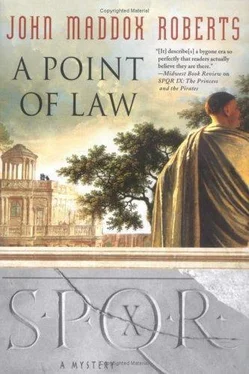John Roberts - A Point of Law
Здесь есть возможность читать онлайн «John Roberts - A Point of Law» весь текст электронной книги совершенно бесплатно (целиком полную версию без сокращений). В некоторых случаях можно слушать аудио, скачать через торрент в формате fb2 и присутствует краткое содержание. Год выпуска: 0101, ISBN: 0101, Издательство: St. Martin, Жанр: Исторический детектив, на английском языке. Описание произведения, (предисловие) а так же отзывы посетителей доступны на портале библиотеки ЛибКат.
- Название:A Point of Law
- Автор:
- Издательство:St. Martin
- Жанр:
- Год:0101
- ISBN:9780312337254
- Рейтинг книги:5 / 5. Голосов: 1
-
Избранное:Добавить в избранное
- Отзывы:
-
Ваша оценка:
- 100
- 1
- 2
- 3
- 4
- 5
A Point of Law: краткое содержание, описание и аннотация
Предлагаем к чтению аннотацию, описание, краткое содержание или предисловие (зависит от того, что написал сам автор книги «A Point of Law»). Если вы не нашли необходимую информацию о книге — напишите в комментариях, мы постараемся отыскать её.
A Point of Law — читать онлайн бесплатно полную книгу (весь текст) целиком
Ниже представлен текст книги, разбитый по страницам. Система сохранения места последней прочитанной страницы, позволяет с удобством читать онлайн бесплатно книгу «A Point of Law», без необходимости каждый раз заново искать на чём Вы остановились. Поставьте закладку, и сможете в любой момент перейти на страницу, на которой закончили чтение.
Интервал:
Закладка:
“I shall do so,” he said, smiling.
“Oh, don’t,” Fulvia said wearily. “Everyone will just take it as further proof that I’m the most disreputable woman in Rome.”
“Nonsense,” he said. “I’ve already undertaken to rehabilitate your reputation. I’ll lay all your indiscretions at the feet of Clodius and his sisters. You were their helpless, unfortunate victim.”
I arched an eyebrow toward Fulvia. She just shrugged. He turned to me.
“Have you any idea why Fulvius chose to attack you? Other than the usual political motives, I mean?”
“None at all. I’d never heard of the man before yesterday. Of course, the City is always full of politically ambitious men, and never more so than at this time of year. Why he should pick me out of all the others he could choose from I can’t guess. Give any well-informed Roman a chance to name the most distinguished men of the Republic, and he’ll be reeling off names for an hour before he thinks of me.”
“You are too modest,” Fulvia assured me. “Even if you aren’t famous for conquering barbarians, you’ve always been popular here in the City, both as a public prosecutor and as an administrator. Not as incorruptible as Cato, I understand, but you’re believed to be relatively honest; and everyone enjoyed the games you celebrated.”
“No one is as incorruptible as Cato, as he’ll tell you himself. And if my games were a hit, it’s because I enjoy them myself.”
“You see?” Curio said. “The people like you because they know you share their tastes. I’m surprised you never sought the tribuneship yourself.”
“My family discussed the possibility a few years ago,” I told him, “but I was in Gaul during the desired year. I was probably safer there. In Gaul you can recognize your enemies from a distance.”
“The tribuneship is not to everyone’s taste,” Curio said.
“Speaking of that office,” I said, “do you know Manilius, the one who’s called the contio to discuss the murder?” I was curious to hear what Curio had to say about the man.
“A good man. I’ve been assisting him all year, sort of an apprenticeship prior to taking on the job myself.” This was not an uncommon practice. Officials always needed helper, and these were often men in training for the same office. Except for a few public slaves, such as those at the Archive and the Treasury, the Republic supplied no staff to assist the elected officials in their work. Instead, they were expected to supply their own, at their own expense.
“He has only a few days left in office,” I said. “I wonder that he wants to take on what could turn into a major case so late.”
“His last major act in office is what will stick in peoples’ minds at the next elections.”
“Where do his ambitions lie?” I asked. “The legions? The courts? Provincial administration?” In earlier times a Roman in public life was expected to be adept at everything. He was supposed to be a soldier, a speaker, a lawyer, a farmer, and many other things. But the Republic had grown huge and complex since the days of our forefathers. It had turned into an Empire, and its public business was too complicated for one man to master it all. The tendency was for men to specialize, so that now we had prominent men who were lawyers undistinguished in war, like Cicero and Hortalus, full-time soldiers like Pompey, and businessmen like Crassus. Caesar was something of a throwback: a man who seemed able to do everything well.
“Manilius acts as if his only ambition is to serve in whatever capacity the Roman people see fit to bestow upon him,” Curio said. “This may be sincere or a pose; I don’t know him well enough to say. Like most of us he started out as a Tribune of the Soldiers. He was with Gabinius in Syria and Egypt. He seems to have served honorably, but I never heard that he earned great distinction. I get the impression that Gabinius didn’t entrust him with as much responsibility as he thought he deserved.”
“He was lucky it wasn’t Caesar,” I said. “Caesar treats his tribunes like none-too-bright schoolboys-tells them to keep their mouths shut and watch the real soldiers at work. A tribune can be with Caesar for a year without being given so much as a squadron of cavalry to command.”
“Is that because he thinks they’re incompetent or because most of them are sons of his political enemies?”
This was a very astute question. Whatever his debts and disreputable history, there was nothing wrong with Curio’s political instincts.
“Both, I believe. Everyone knows the contempt in which Caesar holds the Senate. He also makes it a policy to exalt the centurionate and the common soldiers. This reinforces his influence with the populares . Of course,” I added, “everyone who’s ever soldiered knows what an embarrassment an eighteen-year-old tribune can be. They rarely perform as well as young Cassius did in Syria this year.”
“That boy could become a power in Rome when he returns,” Curio noted. “The Senate may be stingy with the honors it owes him, but he’s sure to be a darling of the plebs for that very reason.”
“I doubt it,” Fulvia said. “I know Cassius. He’s a handsome young man, very bright, but as upright and old-fashioned as Cato. He’ll side with the aristocrats even while they kick him in the face.” There was nothing wrong with Fulvia’s evaluation of men either. Cassius did exactly as she predicted.
Our conversation may seem frank and unguarded for two men who did not know each other, but there was nothing truly unguarded about what we said. We both expected to hold office in the following year. We would have to work with one another, so it made sense to feel one another out while we had this opportunity.
“In recent years,” Curio said, “you’ve been known to break with your family’s optimate stance. Do you intend to switch to the populares?”
“I have no faction,” I intoned gravely. “I always vote for the good of Rome.” This mealy mouthed protestation raised a good laugh. It was what every last politician in Rome always claimed. You never belonged to a faction. Your opponents belonged to factions. Truthfully, I detested the faction politics of the times, but you had to choose one sooner or later. “My family tolerates a little leeway,” I went on, more seriously. “After all, we’ve been anti-Pompeians in the past, but Nepos has never been shut out of family councils even though he’s been Pompey’s lifelong friend and supporter. If I sometimes lean toward the popular cause, it’s always on an issue my family can live with. I suspect that, should it come to a clear break between the factions, I’ll side with my family as always.”
“That would be a pity,” Curio said. “Because the Metelli are sure to stick with the aristocratic side, and the day of the aristocrats is past. Power now lies with the plebs. Clodius knew it, I know it, Caesar most surely knows it.”
“And yet I understand that, until very recently, you stood solidly with the optimates .”
“For a long time I held a young man’s belief in the wisdom of his elders. But we must all grow up sooner or later. Recently, I had a very illuminating talk with Caesar, and I knew it was time to change sides.”
“Caesar covered your debts, too, I hear.”
“There’s no disgrace in that,” he said, quite unembarrassed. “Pompey offered to do as much. The disgrace is in accepting a man’s patronage and then betraying him. Admit it, Decius Caecilius: Wouldn’t it be better for a man like Caesar to manage Rome and Rome’s Empire for the good of all citizens, than for a few dozen dwindling old families to run it all for their own benefit, as if Rome were still a little city-state controlled by a few rich farmers?”
Читать дальшеИнтервал:
Закладка:
Похожие книги на «A Point of Law»
Представляем Вашему вниманию похожие книги на «A Point of Law» списком для выбора. Мы отобрали схожую по названию и смыслу литературу в надежде предоставить читателям больше вариантов отыскать новые, интересные, ещё непрочитанные произведения.
Обсуждение, отзывы о книге «A Point of Law» и просто собственные мнения читателей. Оставьте ваши комментарии, напишите, что Вы думаете о произведении, его смысле или главных героях. Укажите что конкретно понравилось, а что нет, и почему Вы так считаете.









